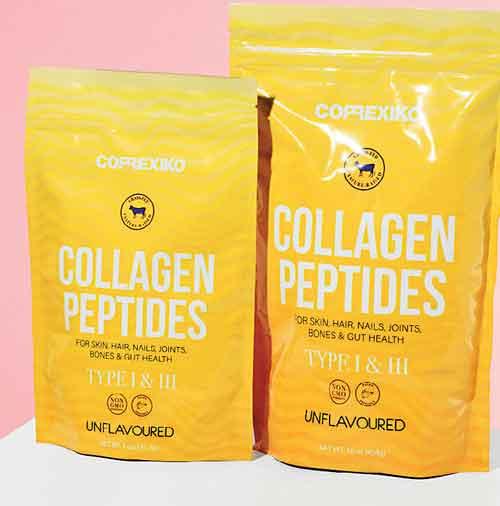Collagen Supplements Do They Really Work?
 Once known for being injected into lips and fine lines, collagen has gone mainstream. Now found in powders, pills, and even colourful gummies, this once-niche protein supplement is being hailed as a daily essential for glowing skin, strong joints, and luscious hair. Celebrities like Jennifer Aniston and Kourtney Kardashian have not only endorsed collagen but have also built it into their morning routines and in some cases, into their businesses (Kourtney’s lifestyle brand Poosh even features collagen among its curated wellness picks). But the question remains: do collagen supplements actually work - and should you be taking them?
Once known for being injected into lips and fine lines, collagen has gone mainstream. Now found in powders, pills, and even colourful gummies, this once-niche protein supplement is being hailed as a daily essential for glowing skin, strong joints, and luscious hair. Celebrities like Jennifer Aniston and Kourtney Kardashian have not only endorsed collagen but have also built it into their morning routines and in some cases, into their businesses (Kourtney’s lifestyle brand Poosh even features collagen among its curated wellness picks). But the question remains: do collagen supplements actually work - and should you be taking them?
What is Collagen, Anyway?
Collagen is the most abundant protein in the human body. Think of it as the framework that holds everything together - it’s a major component of skin, muscles, bones, tendons, and ligaments. It provides structure, strength, and elasticity, playing a vital role in keeping us looking youthful. We naturally produce collagen, but here’s the catch: as we age, our ability to make it slows down. Women, in particular, start to lose collagen in their mid-to-late 20s, and the decline becomes more rapid after menopause. This drop contributes to common signs of ageing: wrinkles, sagging skin, brittle nails, and stiff joints. Lifestyle habits such as smoking, poor diet, excessive sun exposure, and alcohol can accelerate this decline even further.
Before reaching for a supplement, it’s worth knowing that collagen is found naturally in foods. Bone broth, chicken skin, fish (especially the skin and bones), shellfish, and egg whites are all excellent sources
Collagen in Food
Before reaching for a supplement, it’s worth knowing that collagen is found naturally in foods. Bone broth, chicken skin, fish (especially the skin and bones), shellfish, and egg whites are all excellent sources. Foods rich in vitamin C, like kiwis, strawberries, and bell peppers, don’t contain collagen themselves, but they help your body produce it by supporting the enzymes involved in collagen synthesis.

So, Do Supplements Help?
In short: possibly, but with caveats. Collagen supplements are typically hydrolysed (broken down into smaller peptides), which makes them easier for your body to absorb. Some studies suggest that taking hydrolysed collagen peptides may improve skin elasticity, hydration, and dermal collagen density over several months. There’s also some evidence that collagen supplementation may reduce joint pain, particularly in older adults or athletes, and aid recovery from surgery or injury. However, this doesn’t mean collagen is a magic fix. Many of the studies available are small, sponsored by supplement companies, or short-term. Not everyone will see the same results, and it’s not always easy to separate the effects of the supplement from improvements that might also come from lifestyle changes (like better diet, hydration, or skincare routines).
Collagen is the most abundant protein in the human body. Think of it as the framework that holds everything together - it’s a major component of skin, muscles, bones, tendons, and ligaments
Who Might Benefit?
There’s a place for collagen supplements, especially for:
- Postmenopausal women experiencing rapid collagen loss.
- Vegetarians or vegans, who may lack collagen-rich foods (though most collagen supplements are animal-derived).
- People recovering from surgery or injury, where tissue repair is a priority.
- Individuals with limited diets or absorption issues.
That said, a food-first approach is always recommended. Supplements can complement a healthy lifestyle, but they shouldn’t replace nutritious meals, sleep, exercise, and sun protection. Choosing a Collagen Supplement If you decide to try one, choose wisely. Here’s what to look for:
- Hydrolysed collagen peptides (collagen hydrolysate): Aim for 2.5–10g per serving.
- Clinically studied ingredients: Look for added vitamin C, hyaluronic acid, or zinc, which support collagen synthesis and skin hydration.
- Transparency: Quality supplements should disclose the collagen source—marine (fish), bovine (cow), or chicken—and be free from artificial fillers, colours, or added sugars.
- Third-party testing: A mark of quality and safety.
Avoid trendy products that focus more on branding than evidence. And be wary of influencers recommending high doses or claiming “miraculous” transformations especially if the research they cite is questionable.

Any Risks?
Like any supplement, collagen isn’t risk-free. Some people may experience digestive upset or allergic reactions - especially if the source is marine-based. Collagen can also interfere with certain medications or health conditions, so it’s wise to consult a healthcare professional before adding it to your routine.
The Bottom Line
There’s no one-size-fits-all answer when it comes to collagen. Whether it’s worth the investment depends on your personal health goals, budget, and lifestyle. For some, it may offer noticeable benefits. For others, those £300-a-year collagen powders could be better spent on whole foods, good skincare, and a solid SPF. As unglamorous as it sounds, the best way to support your body’s collagen production is through a balanced diet, consistent resistance exercise, quality sleep, and sun protection.








